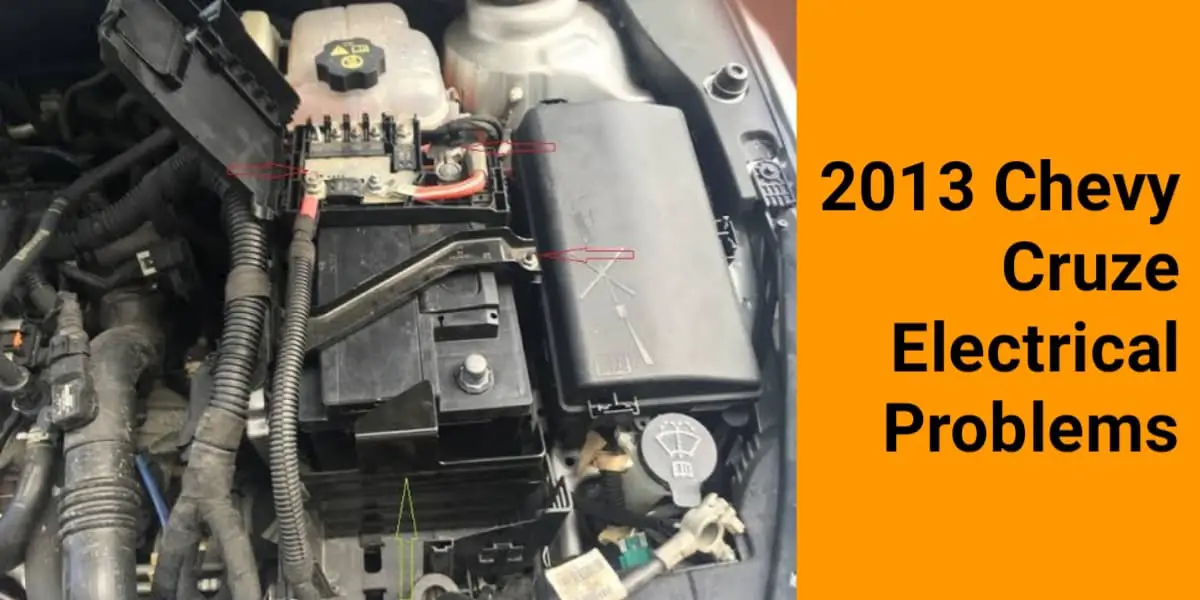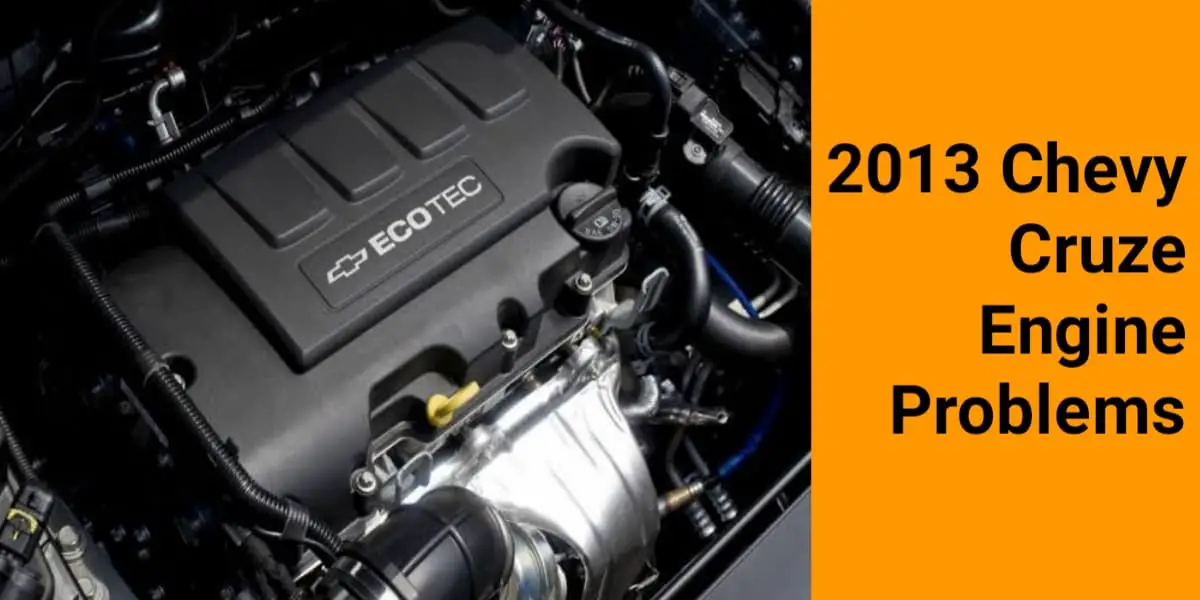As a proud owner of a 2013 Chevy Cruze, I have personally experienced several issues with my vehicle. From engine problems to faulty sensors, the 2013 Cruze seems to have its fair share of issues.
This article will delve into some of the most common 2013 Chevy Cruze Problems owners face, including my own experiences with these issues.
If you are a 2013 Cruze owner, it is important to be aware of these potential problems to maintain and troubleshoot your vehicle properly.
Top 10 2013 Chevy Cruze Problems

These are the Top 10 2013 Chevy Cruze Problems:
1. 2013 Chevy Cruze Transmission Problems
The transmission problems that come with the 2013 Chevy Cruze are quite disturbing and include leakages, gear shift jacking, and poor acceleration of the vehicle.
Transmission leakages are usually caused by the components of the 2013 Chevy Cruze transmission. Transmission problems of the 2013 Chevy Cruze also occur due to a problem with the solenoid, blowing off of the transmission fuse, or issues with the transmission fluid.
Fix:
The fixes for the 2013 Chevy Cruze problems with the transmission are usually expensive and time-absorbing. This is because, in most cases, the transmission problem will be fixed when a transmission replacement is carried out.
Other cases may require repairing the solenoid and/or the transmission fuse. If the transmission fluid causes the problem, you should change the fluid with a new/fresh one.
Chevy 305 Owners can, instead, check out this guide on Common Problems with Chevy 305.
2. 2013 Chevy Cruze Turbo Problems
The 2013 Chevy Cruze problems with the turbo mostly occur when there is a problem with the actuator pin of the turbo.
A significant decrease in power production and poor vehicle acceleration usually marks 2013 Chevy Cruze problems. At first, the check engine light will be illuminated to alert you of the turbo 2013 Chevy Cruze problem.
During the later stages of the turbo problem, the vehicle’s exhaust will start releasing heavy amounts of smoke. Other effects include; damage to the blades in the turbo and leakage of the oil and coolant. Above all, the turbo problem can cause serious damage to the engine.
Fix:
With the severity of damage from turbo problems caused to the 2013 Chevy Cruze, a prompt fix is required to avoid worse damage. Simply put, you can fix the 2013 Chevy Cruze problems by replacing the entire turbo unit with a new one.
3. 2013 Chevy Cruze Thermostat Problems
Loads of earning signals usually accompany 2013 Chevy Cruze problems with the thermostat. When the thermostat of the 2013 Chevy Cruze starts malfunctioning, you will most likely experience the speedy heating of the engine, damage of the head gasket, tough idling of the vehicle, and the emission of white smoke from the exhaust. You may also notice that the vehicle doesn’t warm up or the coolant leaks around the thermostat. The damages associated with this single 2013 Chevy Cruze problem are quite plentiful.
Fix:
To repair the 2013 Chevy Cruze problems with the thermostat, you will most likely need to replace it with a new one.
4. 2013 Chevy Cruze Starting Problems
There are many reasons why the 2013 Chevy Cruze will develop starting problems. The causes of the 2013 Chevy Cruze problems with the starting function range from the low amount of battery voltage to the corrosion or dirtiness of the terminals/contacts of the vehicle’s battery, which leads to the poor passage of current.
The 2013 Chevy Cruze starting problems can also stem from a weakened key fob battery, a damaged starter motor, a failed engine, a clogged fuel filter, and a faulty fuel pump, spark plugs, or alternator.
Fix:
Being a problem caused by various factors, you will need to consider various diagnosis steps to determine the exact cause of the starting problem and the accurate fix. Clean the battery contacts if there is any dirt or corrosion on them. Also, you should replace the following parts the instant you find them damaged;
- Starter motor.
- Alternator.
- Fuel filter.
- Fuel pump.
- Spark plugs.
5. 2013 Chevy Cruze Electrical Problems

Electrical issues are the commonest and most troublesome 2013 Chevy Cruze problems. The vehicle’s electrical system gets faulty because of the battery, poor current flow (caused by corrosion of the battery terminals and cables), and a broken serpentine belt. Likewise, you might need repairs if the alternator, voltage regulator, or fuse is faulty.
Fix:
Since many factors cause the electrical problems of the 2013 Chevy Cruze, you’ll need the help of a professional mechanic to diagnose the actual cause of the electrical problem. Then you can fix or replace the faulty parts.
6. 2013 Chevy Cruze Alternator Problems
When the alternator of a 2013 Chevy Cruze starts malfunctioning, it will fail to provide electricity to the vehicle and leave the vehicle without power.
Fix:
The most effective method to apply in fixing alternator problems of the 2013 Chevy Cruze is by replacing the damaged alternator with a new one.
7. 2013 Chevy Cruze Coil Pack Problems
The 2013 Chevy Cruze problems with the coil pack are quite a discomfort, in the sense that it affects the drivability of the 2013 Chevy Cruze. As this problem worsens, the coil packs will face complete damage.
Fix:
The coil pack problems of the 2013 Chevy Cruze can be fixed by replacing the faulty coil pack(s) with a new one. You can determine the bad coil packs by testing them with a multimeter.
8. 2013 Chevy Cruze Oil Drain Plug Problems
This is not a serious problem, but it is still worth mentioning. This problem occurs when the oil drain plug is tightened any more than 10 lb-ft torque because excessively tightening the plug will damage it easily.
Fix:
You can fix this problem by replacing the oil drain plug with a new one.
9. 2013 Chevy Cruze Engine Misfire Problems
A misfiring 2013 Chevy Cruze engine is usually caused by a malfunctioning coil pack and/or the spark plugs and leads to poor acceleration and low fuel economy.
Fix:
Inspect the coil packs and the spark plugs for any signs of damage. Then, repair or replace the damaged one(s).
10. 2013 Chevy Cruze Water Pump Problems
When a Chevy Cruze’s water pump fails, the usual culprits are the seals, drive pulleys, belts, and even corrosion. A malfunctioning water pump can cause engine overheating and damage the head gaskets.
Fix:
Replace the water pump with a good one.
2013 Chevy Cruze Life Expectancy

Based on the standard capability of a Chevy Cruze, the vehicle can drive for about 200000-250000 miles as long as proper maintenance is practiced. Assuming the vehicle is driven for 15000 miles in a year, the Chevy Cruze should be in perfect working condition for about 13-17 years before it develops serious problems.
Does The 2013 Chevy Cruze Have Engine Problems?

Like every other vehicle, the 2013 Chevy Cruze has engine problems, such as poor fuel economy, stalling, rough idling, starting issues, and many others. Funny enough, most of these problems associated with the vehicle revolve around the engine.
What Is The Most Common Problem With The 2013 Chevy Cruze?
The most common of all the 2013 Chevy Cruze problems are the electrical problems; if you don’t know what to do, you could come down with the worst headache ever trying to diagnose or fix them.
Are you having starter problems with your chevy? Check my post on Chevy Starter Engagement Problems.
Conclusion
The 2013 Chevy Cruze problems are disturbing; ignoring them will only worsen vehicle damage. I hope that with the help of this article, you’ll have less headache fixing your 2013 Chevy Cruze.

